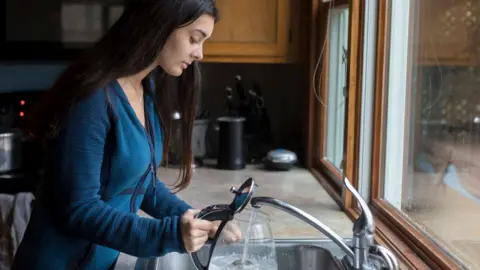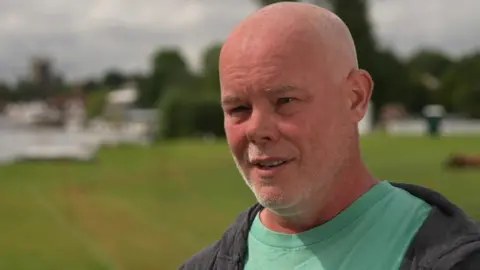By Tom Espiner, Business reporter, BBC News
 Getty Images
Getty ImagesA proposed average 21% hike in bills in England and Wales won’t be enough to address problems including sewage leaks, water firms have warned.
The firms are in a standoff with regulator Ofwat over proposed bill rises.
Ofwat has said it wants firms to limit rises for households to an average of £19 per year until 2030.
But water companies have hit back, saying the regulator had “got this wrong” and warned the bill rises wouldn’t be enough to “deal with the water shortages we know are coming”.
Although the proposed average rise will put more pressure on households, it is a third less than the amount requested by water companies.
The bill hike is intended to fund investment for improvements such as replacing leaking pipes and reducing sewage discharges into rivers and seas.
It comes as suppliers face increasing scrutiny over and public anger over their environmental and financial performance, as well as executive bonuses and pay.
The bill hike varies by region, with Thames Water customers facing an increase of £99 or 23% over the next five years, Anglian customers looking at £66 or 13%, and Southern Water customers facing £183, an increase of 44%.
But this is less than firms had been requesting. For example, Thames Water’s proposed increase of £191 by 2030 was reduced to £99, while Severn Trent’s proposed increase of £144 was lowered to £93.
The proposed bill rises can be challenged by the water firms, with a final determination due at the end of the year, and increases set to take place from April.
David Henderson, chief executive of industry group Water UK, told BBC business editor Simon Jack that the regulators decision was “unrealistic and unfair”.
“Our economy and environment will pay the price,” he added.
A spokesperson for Water UK said the plans were “the biggest ever cut in investment” and argued “the recovery of our rivers will be slower and we will fail to deal with the water shortages we know are coming”.
But Ofwat chief executive David Black said its plan marked the “biggest ever” investment in the water sector and would mean “sustained improvement to customer service and the environment at a fair price for customers”.
He told Radio 4’s Today Programme Ofwat was “very concerned” about the level of bonuses that the companies are paying.
“That’s why we have introduced new measures to protect customers. In the last year, no customer paid for executive bonuses.”
Labour has pledged a crackdown on the water industry, promising consumers higher compensation for sewage failures and the power to hold executives to account.
It plans to introduce new measures to ensure that money earmarked for investment and improvements cannot be diverted to pay salaries or dividends.
The new Secretary of State for Environment Food and Rural Affairs, Steve Reed, spoke to water company bosses on Thursday and said they had agreed to “initial measures to clean up our waterways”.
Mr Reed rejected nationalising any water companies, saying it would “cost money we do not have” and take longer to slow down the process of lowering pollution levels in waterways.
The Consumer Council for Water, an arms-length government body funded by a levy on people’s water bills, estimated about two million households in England and Wales “currently cannot afford their water bill”.
It said an increase in assistance for struggling households was welcome but “falls short of what is needed”, adding “trust in water companies has never been lower”.
As well as the bill rises, the UK’s biggest water firm, Thames Water, is being put under fresh scrutiny by Ofwat, with a new “oversight regime” to make sure the company improves its performance.
The struggling debt-laden firm said this week that it had enough cash to fund its operations until the end of May next year as it continues to raise new investment.
Ofwat said Thames Water must provide a “delivery action plan” and regularly report on progress, assessed by a third party.
Thames Water is at risk of having the credit rating of its debts downgraded by S&P Global, the ratings agency said on Thursday.
According to Ofwat, since privatisation 30 years ago, firms have paid out £53bn in dividends, but have also invested more than £200bn in infrastructure.
However, in 2023, sewage spills into England’s rivers and seas more than doubled.
There were 3.6 million hours of spills last year, compared to 1.75 million hours in 2022, according to the Environment Agency.
‘High levels of pollution’

Dave Wallace is a citizen scientist who has been testing the water in the River Thames where he lives in Henley after some children got ill last year.
“I’d been swimming and found myself swimming in what I’d describe as solids and started wondering what on earth is going on.
“We’ve actually found high levels of pollution and found very high levels of E. coli on the river.”
He said he’s now stopped swimming in the river after reports of an increase in sickness and diarrhoea, as well as people getting infected sores and contracting sepsis.
“It’s not just people but dogs as well. There’s lots of reports of dogs getting ill from going in the water,” he said.


